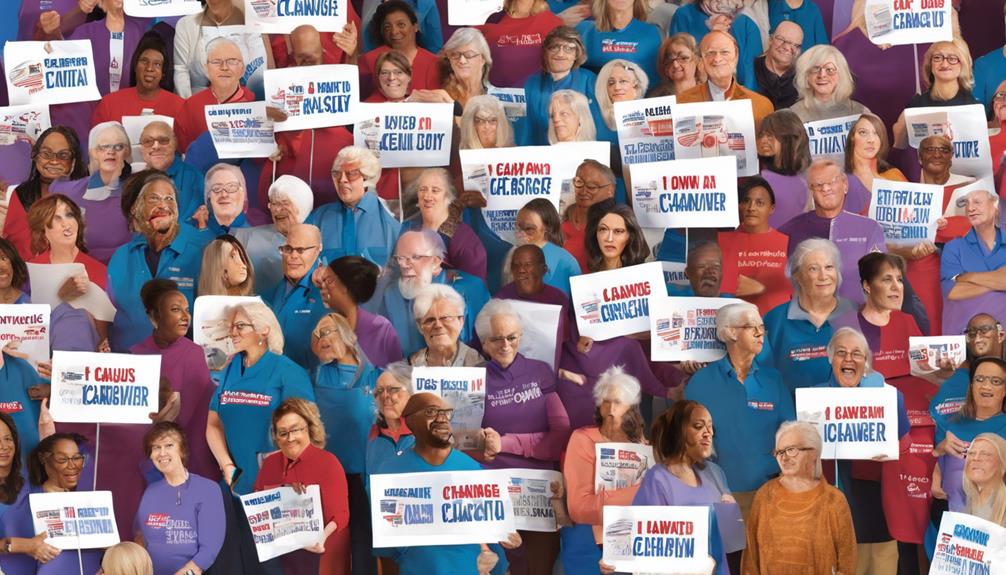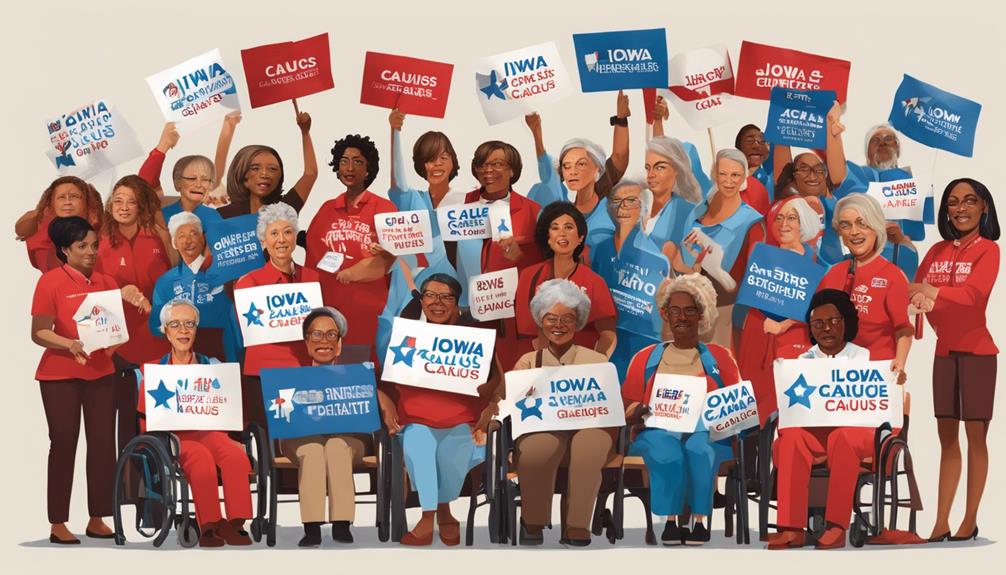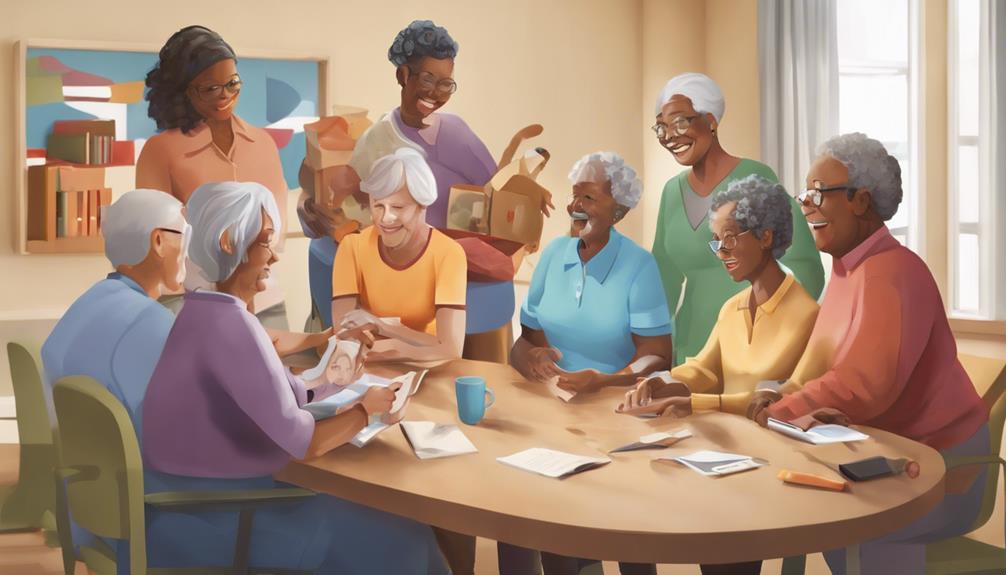The classic saying serves as a reminder that actions speak louder than words.
As we reflect on Iowa Caucus Day, we find ourselves at a pivotal moment where the tireless efforts of caregivers deserve not just acknowledgment but meaningful change.
The dedication and sacrifices of caregivers shape the fabric of our society, yet their struggles often go unnoticed.
Stay tuned to discover how recognizing and supporting caregivers can pave the way for a more compassionate and sustainable future.
Key Takeaways
- Caregivers save billions through unpaid care.
- Comprehensive support services alleviate caregiver stress.
- Urgent policy changes needed for caregiver rights.
- Amplifying voices drives tangible caregiver support reforms.
Recognizing Caregivers' Selfless Contributions
Caregivers across the United States selflessly contribute an estimated $470 billion worth of unpaid care annually, embodying dedication and sacrifice in their roles.
As Family Caregivers, we understand the demanding nature of our responsibilities. Personally, I recall the story of caring for my elderly parent, juggling between their needs and my own. It's a labor of love that often goes unnoticed, yet our contributions to health care are invaluable. Balancing work, family, and personal well-being can be challenging, as we devote an average of 24.4 hours per week to caregiving duties.
The selfless acts of caregivers not only provide essential support to our loved ones but also save the nation billions. Despite the economic impact and the strain on our own health, many caregivers don't receive the necessary support. This underscores the urgency of demanding change in policies and services to assist caregivers in their noble endeavors. Our voices must be heard to ensure that caregivers receive the recognition, resources, and assistance they rightfully deserve.
Advocating for Caregiver Support Services

Advocates emphasize the critical need for comprehensive caregiver support services to address burnout and enhance well-being. Caregiver support services offer resources such as respite care, counseling, and education to assist caregivers in their roles. These services aim to alleviate caregiver stress, provide emotional support, and enhance caregiving skills. Support services may include caregiver support groups, online forums, and access to community resources. Funding for caregiver support services can vary by state and may rely on federal programs like the RAISE Family Caregivers Act.
In advocating for caregiver support services, it's crucial to consider the diverse needs of caregivers across different states. The availability and quality of these services can significantly impact the well-being of caregivers and, by extension, the quality of care provided to those in need. By supporting initiatives like the RAISE Family Caregivers Act, both the Iowa Democratic Party and the Republican Party can demonstrate their commitment to valuing and supporting caregivers. Let's work together to ensure that caregivers have the resources and support they need to continue their essential work.
Demanding Policy Changes for Caregivers
In the realm of caregiving policy reform, the urgent call for change resonates across various sectors and communities. Addressing the challenges faced by family caregivers is crucial, with caregivers experiencing emotional and physical exhaustion, financial strain, social isolation, and lack of support. The fragmented U.S. elder care system exacerbates issues like elder abuse, neglect, and financial exploitation, underscoring the need for significant policy changes. Presidential candidates hold a key role in tackling the national caregiver crisis by advocating for the protection of the elderly, caregivers' rights, and financial support.
| Policy Changes for Caregivers | Advocacy for Family Caregivers | Protecting the Elderly |
|---|---|---|
| Enhancing caregiver support services | Amplifying caregiver voices in policymaking | Strengthening legal frameworks against elder abuse |
| Implementing paid family leave policies | Lobbying for increased funding for caregiver programs | Establishing educational campaigns on recognizing and reporting elder abuse |
| Ensuring access to affordable healthcare | Collaborating with legislators for caregiver-friendly policies | Supporting initiatives for financial assistance to elderly in need |
Amplifying Caregivers' Voices for Reform

Amid the urgent calls for policy changes in the caregiving landscape, amplifying the voices of those directly impacted becomes a critical catalyst for reform. Caregivers play a crucial role in supporting their loved ones, facing various challenges along the way.
Here are three ways to amplify caregivers' voices for reform:
- Sharing Personal Stories: Encouraging caregivers to share their experiences can humanize the need for change in the elder care system. Personal narratives have the power to evoke empathy and drive home the urgency of caregiver support and policy change.
- Engaging in Advocacy Efforts: By actively participating in advocacy campaigns and initiatives, caregivers can ensure that their concerns are heard by policymakers. Advocacy plays a vital role in pushing for improved elder care system reform and protection against abuse and exploitation.
- Collaborating for Policy Change: Caregivers must engage with policymakers and demand concrete actions to address the challenges they face. Collective action is key in driving tangible changes that prioritize caregiver support and make long-term care more affordable.
Cultivating a Culture of Caregiver Appreciation
Cultivating a culture of appreciation for caregivers involves recognizing their invaluable contributions and advocating for policies that prioritize their well-being. Caregivers are the unsung heroes who provide essential care and support to loved ones facing health challenges. They juggle multiple responsibilities, often at the expense of their own physical, emotional, and financial well-being. Recognizing and supporting caregivers is paramount to prevent burnout and ensure the holistic care of both caregivers and care recipients.
Advocacy for caregivers involves pushing for policies that offer tangible support, such as access to respite care, financial assistance, and emotional counseling. By championing these causes, we can create a more nurturing environment that values and respects the sacrifices made by caregivers. It's essential to elevate the voices of caregivers in discussions around healthcare reform and social support systems.
Together, by acknowledging the vital role caregivers play and advocating for policies that meet their needs, we can foster a culture of appreciation that uplifts and sustains those who provide care for our loved ones.
Frequently Asked Questions
Who Won the Last Iowa Caucus?
We remember that Pete Buttigieg won the last Iowa Caucus with 26.2% of the state delegate equivalents, closely followed by Bernie Sanders with 26.1%.
The 2020 Iowa Caucus faced controversy due to technical issues with the caucus app, causing delayed reporting. Buttigieg's victory was a significant moment in the Democratic primary race.
These events marked a pivotal time in the political landscape, reflecting the complexities of the democratic process.
Do Democrats Caucus in Iowa?
Yes, Democrats caucus in Iowa.
The Iowa Democrats' caucus is a crucial event where unbound delegates and precinct committee persons are elected.
This process centers on addressing platform resolutions and party organization matters.
Unlike other states, Iowa Democrats don't express presidential preferences during the caucus, opting for a mail-in format.
It's a unique event that plays a significant role in shaping the party's direction and priorities.
Conclusion
As we celebrate Iowa Caucus Day and honor caregivers, let's remember that their unwavering dedication deserves more than just a day of recognition.
It's time for policymakers to listen, for society to appreciate, and for caregivers to receive the support they deserve.
Let's turn the tide on caregiving challenges and create a future where caregivers are valued, respected, and truly seen for the heroes they are.









